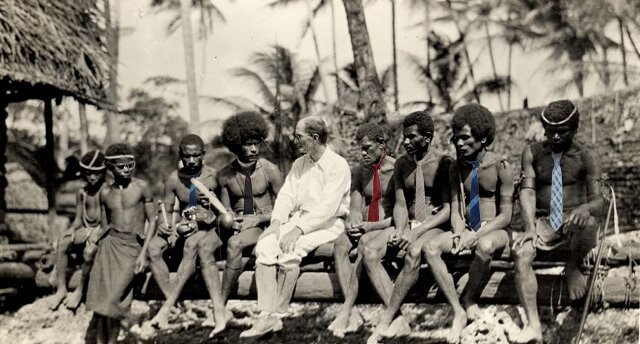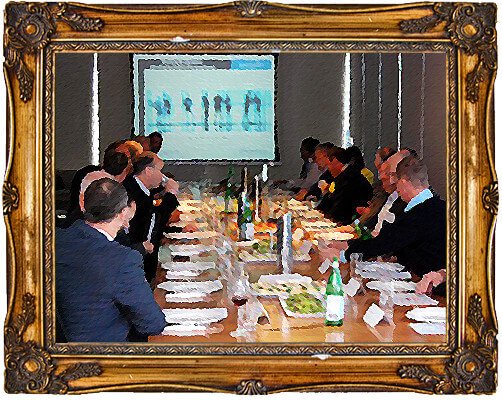Businesses As Communities of Practice and Maintaining the Anthropological Perspective from Within

MAKING SENSE OF THE WORLD: THE IMPLICIT THEORIES AND LANGUAGE PRACTICES OF BUSINESS
Work within advanced economies is conducted by a wide range of engineers, technicians, marketing specialists, managers, analysts and knowledge producers. Each business, as well as the various professional fields that converge in them, constitute communities of practice with distinct language practices, objectives, and value systems (see Hepso 2013:155; Sunderland and Denny 2014:19; Ensworth 2013:69-72; Denny 2013:149). Work processes are also rife with business challenges, office politics, organizational directives, client demands, and management styles. Anthropologists, particularly from within linguistic anthropology, point out that the performativity of language predetermines what constitutes worthwhile pursuits and organizes practices and future developments (see Callon 1998; Callon 2007; Holmes 2009; Silverstein 2006; Denny 2013). Reality – as well as the expectations of possible futures – are all mediated in the performance of explanatory models so that “the very discourse of how the economy works [for instance] creates the economic realities it purports to theorize and explain” (Denny 2013:141).
How businesses use or understand what anthropology and ethnography has to offer is often the starting point at which communication is framed and is still today very much an ongoing conversation. In their introduction to the Handbook of Anthropology in Business, Sunderland and Denny state that “success in this regard is contingent on how others view anthropologists and anthropology and, importantly, is fueled by anthropologists’ positionality in the workplaces inhabited” (19). In regards to the practical positionality of anthropologists in business, Melissa Cefkin points out that “ethnographic work in industry most commonly takes the form of a ‘project.’ Contrasting with work defined by persistent and repeated activities (such as standard accounting practices)” (Cefkin 2013:117). Given the nature of ethnographic work and the flurry of roles and activities that enable the proper functioning of businesses, practicing anthropologists must continuously justify their work as relevant and meaningful from within the borders of the distinct imperatives, constraints, and organizational structures of the business contexts that they find themselves in.
Vitally important to being heard and understood as an anthropologist working for business is an ability to recognize and adapt to the language, objectives, and models of the domain. In her 2009 EPIC paper, “Showing The Value of Ethnography in Business,” Joan Vinyets Rejón (2009: 172) suggests, “it is necessary to develop a systematic approach to the company. It should start with a sound understanding of the organization, culture, structure and innovation process. With this knowledge it is easier to limit and focus the value contribution”.
Fortunately, understanding the linguistic practices and implicit theories within business is an area in which anthropologists can proactively engage their own training. Developing appropriate strategies to facilitate the effective communication of anthropological insights in a language that is accessible in what Rick Robinson calls a “rigorous formulation” (Cefkin 2010:47). This dynamic creates a situation in which practicing anthropologists are obliged to play dual roles, both working in, and for, businesses because “unless the findings are framed appropriately, they will not be heard, will not count as knowledge, and will not be acted upon” (Cefkin 2010:47).
LOST IN TRANSLATION: HYBRIDITY AND ISSUES MAINTAINING THE ANTHROPOLOGICAL PERSPECTIVE FROM WITHIN
Towards this end, many practitioners also seek out professional training in a business domain outside of anthropology in order to gain entrée into the community of practice and to become fluent in its discourses, models, and objectives. “Anthropologists, who are uniquely positioned to learn from other disciplines and to learn about clients’ businesses, have the means to become highly creative strategic consultants who will produce valuable insights” (Baba 2014:60).
However, even experienced anthropologists describe this undertaking as a delicate balance between overlapping worldviews that challenges their ability to maintain their own sense of professional identities and practices as anthropologists. The practitioner working “in” business can become so immersed in an organization’s culture that they lose sight of the anthropological capacity to analyze and interrogate its everyday practices because “the language used tends to create its own encompassing, often inescapable frame” (Sunderland and Denny 2014:20).
CONCLUSION
It is clear that understanding and adapting their language and findings to the models furthers the anthropological voice in business and provides opportunities to exercise the classic ethnographic objective to seek, understand, and interpret the perspective of the native’s point of view. While resistance to, or ignorance of, business frameworks runs the risk of rendering the anthropological voice as an outmoded discipline that has no place-value in business, as well as inadvertently reducing the methods of inquiry to mere external critiques in the vein of armchair anthropology. It is this dilemma that led Patricia Sunderland to conclude in her chapter, “The Cry for More Theory,” that “theorizing is the work that needs doing if we, as lurking monster-practitioners, are to turn our positions into ones of anthropological beauty, theoretically, pragmatically, and responsibly” (2013:134).
Importantly, Sunderland’s conclusion is not to suggest a view that anthropology and anthropologists working in and for business is problematic, but that the observational, analytical, and interpretive lenses of anthropology is a fundamental characteristic of the discipline and ethnography as a research methodology. In order to be successful and effective as an anthropologist working in business the anthropological perspective must both be framed from within the distinct language practices, objectives, and value systems of the business – and maintained as an uncompromised form of inquiry into shared cultural systems.
Works Cited
Baba, Marietta L. 2014. “De-Anthropologizing Ethnography: A Historical Perspective on the Commodification of Ethnography as a Business Service.” In Handbook of Anthropology in Business, edited by R. Denny and P. Sunderland, 43-68. New York, London: Routledge.
Callon, Michel. 1998. Laws of the Markets. Oxford: Blackwell.
Callon, Michel. 2007. “What Does It Mean To Say That Economics Is Performative?” In Do Economists Make Markets?, edited by D. Mackenzie, F. Muniesa, and L. Siu, 301-357. Princeton: Princeton University Press.
Cefkin, Melissa. 2010. “Practice at the Crossroads: When Practice Meets Theory, A Rumination.” Proceedings of the 6th Ethnographic Praxis in Industry Conference2010:46-58.
Cefkin, Melissa. 2013. “The Limits to Speed in Ethnography.” In Advancing Ethnography in Corporate Environments, edited by B. Jordan, 108-121. Walnut Creek, CA: Left Coast Press.
Cefkin, Melissa. 2014. “Work Practice Studies as Anthropology.” In Handbook of Anthropology in Business, edited by R. Denny and P. Sunderland, 284-298. New York, London: Routledge.
Denny, Rita. 2013. “The Cry of Practicality.” In Advancing Ethnography in Corporate Environments, edited by B. Jordan, 136-50. Walnut Creek, CA: Left Coast Press.
Ensworth, Patricia. 2013. “Ethnography for Systems Development: Renovating the Legacy.” In Advancing Ethnography in Corporate Environments, edited by B. Jordan, 56-75. Walnut Creek, CA: Left Coast Press.
Hepso, Vidar. “Doing Corporate Ethnography as an Insider (Employee).” In Advancing Ethnography in Corporate Environments, edited by B. Jordan, 151-162. Walnut Creek, CA: Left Coast Press.
Holmes, Douglas. 2009. “Economy of Words.” Cultural Anthropology 24(3):381-419.
Rejón, Joan Vinyets. 2009. “Showing the value of Ethnography in Business.” Proceedings of the 5th Ethnographic Praxis in Industry Conference 2009:168-175.
Silverstein, Michael. 2006. “Old Wine, New Ethnographic Lexicography.” Annual Review of Anthropology 25:481-496.
Sunderland, Patricia. 2013. “The Cry for More Theory.” In Advancing Ethnography in Corporate Environments, edited by B. Jordan, 122-35. Walnut Creek, CA: Left Coast Press.
Sunderland, Patricia and Rita Denny. 2014. “Introduction.” In Handbook of Anthropology in Business, edited by R. Denny and P. Sunderland, 13-32. New York, London: Routledge.
Recommend0 recommendationsPublished in Business Anthropology, Career Resources, Linguistic Anthropology, Organizational Anthropology




Responses